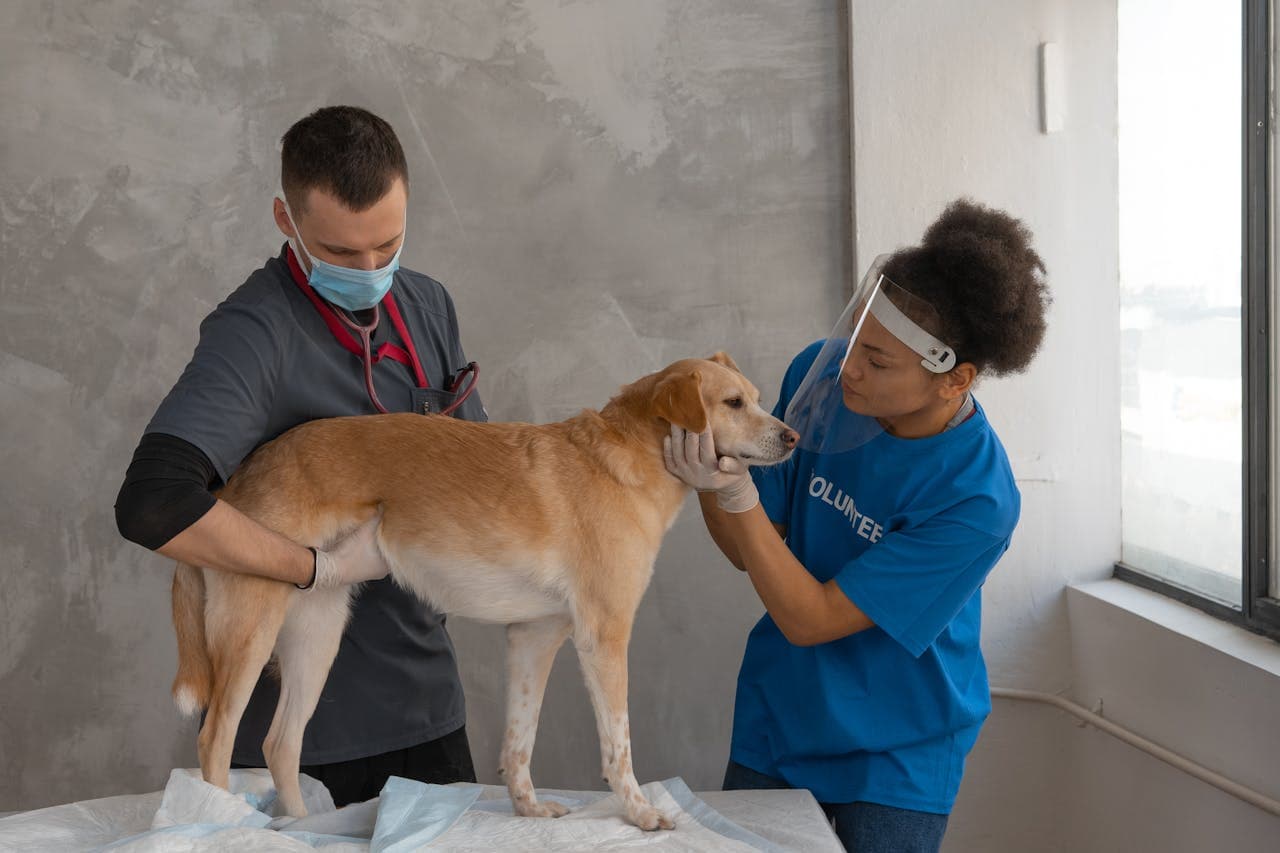







The complete guide to
dog and cat
medical conditions

Our guide has been authored by qualified veterinarians, but should not be taken as substitute for medical advice or professional veterinary consultation. If your pet displays any unusual symptoms, we strongly advise seeking guidance from a veterinarian
Find your perfect match

Acute Gastroenteritis (Stomach Flu)
Acute Gastroenteritis is a sudden disruption in the digestive system’s normal function. It’s usually caused by viruses, bacteria, or parasites that enter the digestive system via contaminated external sources or due to natural causes. Acute Gastroenteritis typically lasts a few days, causing discomfort for the dog and their owner, and typically doesn’t require more than supportive care. However, in some cases, it can lead to dehydration or severe illness, requiring hospitalization.

Addison’s Disease
Addison’s disease, also known as Hypoadrenocorticism, is an endocrine disorder stemming from a disruption in the body’s hormone production. The adrenal glands, located near the kidneys, are responsible for producing steroid hormones like aldosterone and cortisol, which play critical roles in things like regulating blood electrolyte and sugar levels, managing stress responses, and suppressing inflammatory reactions.
This disease affects mostly middle-aged dogs and is more common in females. Symptoms range in severity from mild, intermittent clinical signs to a life-threatening condition known as an “Addisonian crisis”.

Alopecia X
Alopecia X, also known as “Black Skin Disease” or “Coat Funk”, is a skin condition that primarily affects only certain breeds of dogs, particularly ones with a plush coat – longer, fuller fur. Alopecia X manifests in a disruption of normal hair growth, which leads to bald spots. It’s a somewhat mysterious and poorly understood disorder, but it is believed to be linked to hormonal imbalances, specifically involving sex hormones.

Atopic Dermatitis
Atopic Dermatitis is a common chronic skin condition characterized by redness, itching, and inflammation. It typically appears as dry, scaly patches on the skin and can be triggered by various factors such as allergens, environmental irritants, or foods. In dogs, atopic dermatitis manifests similarly to humans, with clinical signs including itching, scratching, licking, and skin irritation. It often affects areas such as the face, ears, paws, and groin. Dogs with atopic dermatitis may also develop secondary skin infections due to scratching and self-trauma.

Bladder Stones
Bladder stones, also known as urinary calculi or uroliths, are mineralized masses that form in the urinary bladder of dogs. These stones can vary in size, ranging from small, gravel-like particles to larger, more solid structures. They are composed of minerals and other substances that are normally present in urine, such as calcium, oxalate, struvite, or urate. These stones develop when there is an imbalance in the concentration of minerals or an abnormality in the urine composition.

Bone Fractures
Bone fractures can be common in dogs. The bones most prone to breaking are the long bones – the femur and tibia in the hind legs, the radius and ulna in the front legs, the pelvic bones, ribs, bones in the paw’s toe root, and toes. There can also be fractures in the vertebrae that may lead to significant nerve damage if they endanger the integrity of the spinal cord.
There are several types of fractures:
-
- Closed fracture – when the fracture line does not break through the skin tissue.
- Open fracture – the broken ends of the bone pierce through the skin, causing a wound. This type of fracture poses a greater health challenge due to the risk of infection.
- Simple fracture – a single fracture line extending across the width of the bone or diagonally.
- Compound fracture – a bone that has broken or shattered into several pieces. These cases are usually more complicated to treat.
In certain traumatic situations, fractures may be accompanied by additional significant injuries and life-threatening conditions such as hemorrhage and damage to the nervous, respiratory, and urinary systems. In such cases, life-threatening injuries are addressed first, and fracture treatment follows only after stabilizing the patient’s condition.
-

Brachycephalic Obstructive Airway Syndrome (BOAS)
Brachycephalic Obstructive Airway Syndrome (BOAS), is a medical condition that affects certain dog breeds with brachycephalic (short-nosed) facial structures. It is characterized by a combination of anatomical abnormalities in the upper respiratory tract, which can cause breathing difficulties and respiratory distress.

Canine Bloat
Bloat, or gastric dilatation-volvulus (GDV), is a condition where the stomach becomes distended and expands due to the accumulation of gas (air, for example), causing pressure on the blood vessels along the stomach wall and the spleen. In severe cases, gas accumulation may cause the stomach to rotate in a twisting motion around its axis, known as volvulus. This movement generates pressure on the diaphragm, which is adjacent to it, as well as on central blood vessels responsible for supplying blood to the abdominal organs. From that moment on, within minutes, a state of shock may develop due to disruption of blood flow and multi-systemic damage, including disturbances in heart rate and respiratory failure.

Canine Distemper
Canine distemper is a severe and highly contagious disease caused by a virus that affects dogs, primarily unvaccinated puppies. The virus targets the respiratory, gastrointestinal, and nervous systems and other areas of the body. While canine distemper is most commonly found in dogs, they can transmit the virus to other animals, such as ferrets.
Fortunately, this dangerous disease can be prevented through vaccination. Regular vaccinations are crucial to prevent unnecessary pain and death and stop the spread of the virus to other animals.

Cataracts
Just like in humans, the role of a dog’s lens is to focus light, so it needs to be transparent to allow light to be properly absorbed by the retina. In the case of cataracts, the lens becomes opaque, preventing light from passing through it. This condition impairs vision, can lead to blindness, and directly affects the quality of life for the dog and its owners.
Questions People Ask Us

What are the warning signs that indicate I should seek veterinary care?
While many dog owners can recognize when their pet is unwell, there are specific signs that should immediately prompt you to contact or visit your veterinarian. These include apathy, difficulty breathing, rapid pulse, tremors, frequent vomiting, diarrhea, red or cloudy eyes, trouble standing or moving, and a noticeable limp.
What behavioral cues suggest that my dog is experiencing pain?
When a dog is in pain due to illness or a medical issue, several behavioral changes may become apparent. These include a decrease in mood, loss of appetite, increased aggression such as growling or biting, restlessness, seeking hiding spots, avoiding social interactions, reduced activity or reluctance to engage in normal behaviors, and inappropriate elimination.
My dog is unwell and the clinic is closed. What should I do?
In such situations, it’s essential to act swiftly to ensure your pet receives the care they need. Utilize various resources such as the internet, your veterinarian’s contact information, or recommendations from friends to locate an emergency veterinary clinic nearby. Immediate action is crucial for your pet’s well-being, so don’t hesitate to seek help without prior approval. Once your pet has received the necessary treatment, you can then proceed to submit a claim through the website’s personal area. To prepare for future emergencies, consider compiling a list of emergency centers in your area or any places you frequently visit, ensuring you have contact details readily available when needed.
Does the insurance also cover pre-existing illnesses that my dog has?
No, insurance typically does not cover pre-existing conditions. The purpose of insurance is to provide coverage for unforeseen events that occur after the policy is in effect. Similar to human insurance, pet medical insurance does not cover conditions that existed before you purchased the policy or during the waiting period.
What about medications for various diseases? Are they covered by insurance?
Yes, medications prescribed by the veterinarian during a visit, as well as those purchased afterwards or retrospectively, are covered. This includes steroids, antibiotics, anti-inflammatories, pain relievers, drops, or ointments…we cover them all.








